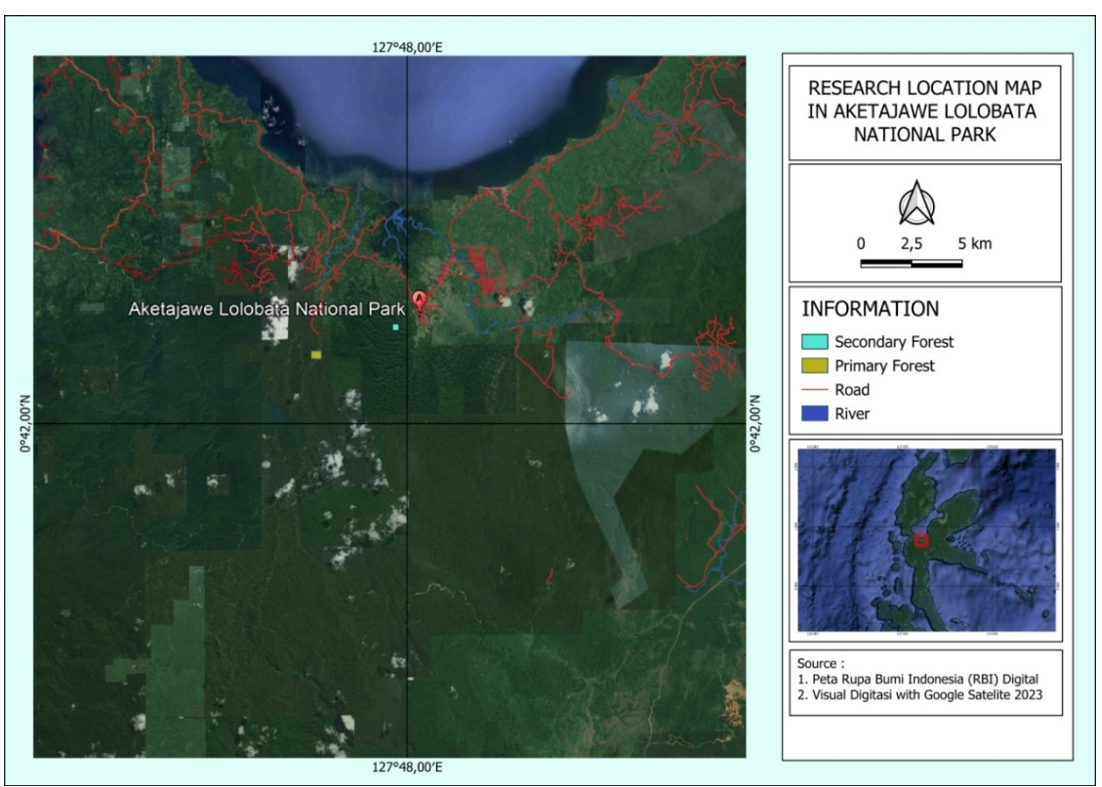Bird diversity in Aketajawe Lolobata National Park

Downloads
Downloads
Aketajawelolobata.org. (2023). Profil Taman Nasional Aketajawe Lolobata. Retrieved from https://aketajawelolobata.org/profil/. 29 May 2023.
Alikodra, H. (2002). Pengelolaan Satwa Liar. Fakultas Kehutanan IPB Bogor Pr, Bogor, Indonesia.
Bibby, C., Jones, M., Marsden S. (2000). Expedition Field Techniques Birds Surveys. Expedition Advisor Centre, London.
CITES (Convention on International Trade in Endangered Species of Wild Fauna and Flora). (2023). CITES-listed species. https://cites.org/eng. 29 May 2023.
Coates, B.J., Bishop, K.D. (2000). Panduan Lapang Burung-Burung di Kawasan Wallacea: Sulawesi, Maluku, dan Nusa Tenggara. BirdLife International-Indonesia Programme, Jakarta, Indonesia.
Clout, M., Hay, R. (1989). The importance of birds as browsers, pollinators and seed dispersers in the New Zealand forests. New Zealand Journal of Ecology, (12), 27-33.
Dahiya, P., Singh, D., Delu, V., Yodha, K., Dahiya, T., Kour, A., & Punia, N. (2022). Role of birds in agroecosystem: A review on agricultural and economic ornithology. The Pharma Innovation Journal, 11 (7), 2300-2314. www.thepharmajournal.com.
Dewi, Y., Mulyani, R.S., Santosa, Y. (2007). Keanekaragaman jenis burung di beberapa tipe habitat Taman Nasional Gunung Ciremai (skripsi). IPB University. Bogor.
Ekarelawan, O.J.J.H.H. (1990). Pola pembinaan habitat burung di kawasan pemukiman terutama di perkotaan. Media Konservasi, 3 (1),1-7.
Hadinoto., Mulyadi, A., Siregar, A.I. (2012). Kenakeragaman jenis burung di Hutan Kota Pekanbaru. J. Ilmu Lingkungan, 6 (1), 25-42. http://dx.doi.org/10.31258/jil.6.1.p.25-42.
IUCN Red List. (2022). The IUCN red list of threatened species. Retrieved from https://www.iucnredlist.org/. 29 May 2023.
Krebs, C.J. (1978). Ecology: The Experimental Analysis of Distribution and Abundance. Harper and Row Publishers, New York, USA.
Ludwig, J.A., & Reynolds, J.F. (1988). Statistical Ecology: A Primer Methods and Computing. John Wiley & Sons, New York, USA. p.200.
Magurran, A.E. (2004). Ecological Diversity and Its Measurement. Princenton University Pr, New Jersey, UK.
Mardiastuti, A. (2015). Ekologi Satwa Pada Lanskap Yang Didominasi Manusia. Fakultas Kehutanan IPB Bogor Pr, Bogor, Indonesia.
Mufti, F., Diniarsih, S., Untung, M., Setyono, J., Amna, M., & Setyobudi, N. (2011). Diversity of birds in Tepus Village of Gunung Kidul District of Yogyakarta. Proceeding ICBB (The International Conference on Bioscience and Technology) 1 (1), 102011. Retrieved from https://sunankalijaga.org/prosiding/index.php/icbb/article/view/174.
Nainggolan, F., Dewi, B., & Darmawan, A. (2019). Status konservasi burung: studi kasus di Hutan Cugung Kesatuan KPH lindung model Rajabasa Kecamatan Rajabasa Kabupaten Lampung Selatan. J.Sylva Lestari, 7 (2), 52-61. http://dx.doi.org/10.23960/jsl1752-61.
Ontario, J., Hernowo J.B., Haryanto., & Ekarelawan. (1991). Pola Pembinaan Habitat Burung di Kawasan Pemukiman Terutama di Perkotaan. Departemen Konservasi Sumberdaya Hutan dan Ekowisata Fakultas Kehutanan IPB University, Bogor, Indonesia.
Prasetyo, E., & Wulandari, R. (2021). Richness, diversity, and conservation status of bird species in Maron Beach, Semarang Indonesia. Quagga: Jurnal Pendidikan dan Biologi, 13 (1), 95-102. https://doi.org/10.25134/quagga.v13i1.3664.
Rohman, S.N., Mardiastuti, A., & Mulyani, Y.A. (2023). Bird diversity in several land use types in Boyolali, Central Java. IOP Conf. Ser.: Earth Environ. Sci. 1220 012009. https://doi.org/10.1088/1755-1315/1220/1/012009.
Soehartono, T., & Mardiastuti, A. (2003). Pelaksana Konvensi CITES di Indonesia. Japan International Cooperation Agency (JICA) Press, Jakarta, Indonesia.
Shah, S.B., Sharma, H.P. (2022). Bird diversity and factors affecting bird abundance at Dullu Municipality, Dailekh, Nepal. Biodiversitas, 23 (3), 1535-1545. https://doi.org/10.13057/biodiv/d230343.
Tamnge, F., Mulyani, Y.A., & Mardiastuti, A. (2013). Keanekaragaman jenis burung pada beberapa tipe habitat di Pulau Ternate. [thesis]. Fakultas Kehutanan IPB University, Bogor, Indonesia.
Tu, H.M., Fan, M.W., & Ko, J.C.J. (2020). Different habitat types effect bird richness and evenness. Sci Rep 10, 1221. https://doi.org/10.1038/s41598-020-58202-4.
Warmetan, H., Kesaulija, F.F., & Sadsoeitoeboen, B.M.G. (2015). Keragaman dan Status Konservasi Jneis Burung Air di Danau Yamor. Jurnal Kehutanan Papuasia, 1 (2), 99-107. https://doi.org/10.46703/jurnalpapuasia.Vol1.Iss2.35.








